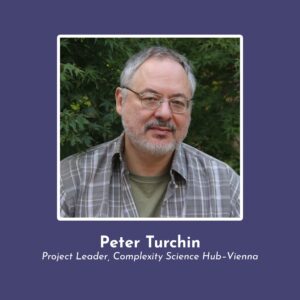
Ep 164 | Peter Turchin
Peter Turchin: “The ‘Decline’ of Nations: How Elite Surplus and Inequality Lead to Societal Upheaval”
Show Summary
The first few months of the new year have brought a cacophony of political news and power plays, bringing with it an uproar of public outrage in the United States and around the world. In the midst of an unprecedented moment in modern history, what can history – and even mathematics – teach us about moments of political unrest and upheaval?
In this episode, Nate is joined by complexity scientist, Peter Turchin, to discuss his work modeling the key factors that drive patterns of peace, turmoil, and revolution in nations throughout history – and how those connect to the situation in the United States today. Turchin outlines the cyclical nature of ‘elite overproduction’ and its role in political disintegration, emphasizing the importance of economic inequality and elite struggles for control.
How does a declining standard of living, as seen in the U.S. over recent decades, affect a nation’s stability, civic engagement, and levels of violence? In what ways has history been shaped by the ‘wealth pump’ moving economic power towards the hands of the few? Lastly, how can we use these historical lessons to strengthen our communities and act collectively in times of chaos and instability?
About Peter Turchin
Peter Turchin is a complexity scientist who works in the field of historical social science that he and his colleagues call Cliodynamics. His research interests lie at the intersection of social and cultural evolution, historical macrosociology, economic history and cliometrics, mathematical modeling of long-term social processes, and the construction and analysis of historical databases.
Currently his main research effort is directing the Seshat Databank project (and its offshoot, CrisisDB) which builds and analyzes a massive historical database that enables us to empirically test predictions from theories attempting to explain why and how complex human societies evolved, and why they periodically experience political breakdown. Turchin has authored ten books. His most recent books are End Times: Elites, Counter-Elites, and the Path of Political Disintegration and The Great Holocene Transformation (forthcoming).
In French, we have a motto that says that a simple drawing is often better than a long explanation. Jean-Marc Jancovici Carbone 4 President
That’s very understandable because with left atmosphere thinking, one of the problems is that you see everything as a series of problems that must have solutions. Iain McGilchrist Neuroscientist and Philosopher
We can’t have hundreds and hundreds of real relationships that are healthy because that requires time and effort and full attention and awareness of being in real relationship and conversation with the other human. Nate Hagens Director of ISEOF
This is the crux of the whole problem. Individual parts of nature are more valuable than the biocomplexity of nature. Thomas Crowther Founder Restor
Show Notes & Links to Learn More
Download transcript00:00 – Peter Turchin info + works, Complexity Science Hub, Book: End Times
01:09 – Cliodynamics
03:23 – Isaac Asimov + Psychohistory
05:00 – Mathematical chaos
06:39 – Dennis Meadows + TGS Episode
07:08 – 2010 prediction about US political instability
08:33 – Social Complexity & Collapse research group
12:30 – The US productivity-pay gap + more info
14:46 – Number of billionaires in the US over time
16:20 – Who are the elites?
17:19 – Russian oligarchs
17:47 – Elite overproduction
19:18 – Immiseration
28:34 – 1929 stock market crash + 1870s US recession
29:29 – New Deal + American Civil War
30:47 – Iron law of oligarchy
31:48 – Early state formation
32:04 – The collapse of small-scale societies
36:06 – Declining life expectancy in US + in 2017
39:23 – Chartism in the UK
40:38 – Age of Revolutions, Taiping Civil War
41:00 – UK Reform Act of 1832
41:45 – Democracy in America
41:52 – Great Reforms of Alexander II
42:16 – 1917 Russian Revolution
44:22 – The Black Death
45:19 – Food prices and the French Revolution
46:06 – Trends in income inequality in different countries
48:42 – Jeremy Grantham + TGS Episode
49:47 – Impacts of the Black Death
52:21 – When AI comes for the elites
53:27 – Impact of AI on law jobs







